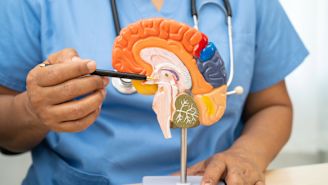Updated on October 2, 2025.
At a fundamental level, weight loss comes down to a simple formula: reduce your calorie intake, increase your activity level, and you’ll start to see changes to the numbers on the scale. Right?
In reality, it’s not always so straightforward.
While getting exercise and making smart food choices—both what you eat and how much—matter a lot, your body also has a few biological mechanisms that can derail even the best-laid plans.
In the first installment of our Science of Weight Loss series, Darria Long Gillespie, MD and Keith W. Roach, MD discussed the mechanics of weight loss. Now, Dr. Gillespie and Dr. Roach help us make sense of one of the trickier pieces of the weight loss puzzle: your metabolism.
Is weight loss just a matter of getting the math right?
Dr. Gillespie: Kind of. But it’s first useful to understand the three main ways that you burn calories.
First, there's your resting metabolic rate, the energy your body expends performing the basic functions of life. In other words, the calories you burn to keep your heart beating, your lungs breathing, your brain running. That depends on your sex, your age, your height, and your weight.
A younger, more muscular person might burn more calories at rest than an older person of the same weight who has less muscle. This resting—or basal—metabolic rate makes up the majority of the calories you burn, anywhere between 60 and 80 percent.
Then there's your level of physical activity, which can increase your resting calorie expenditure by as little as 10 percent if you’re sedentary to as much as 30 percent if you're very active.
Lastly, you burn a little bit of energy—around 10 percent—by digesting food and through thermogenesis, which is when your body burns calories to keep itself warm.
So exercise yields only about 30 percent of your daily calorie burn?
Dr. Roach: I’m afraid so, for the most part. If I can double my metabolic rate for a day through exercise, I'm having a really good day.
Dr. Gillespie: And let’s be clear, that’s very unusual. Even if I run four miles, I’m still only burning an extra 400 calories or so.
Dr. Roach: Yes, that’s about the upper end of the possible—and requires me walking many miles plus doing cardio—and most people don’t manage that.
Imagine that you are taking in and expending roughly 2,000 calories a day. Most people aren't burning more than a couple hundred calories’ worth in exercise on any day above their sedentary level. A couple of hundred calories, while great, is only about a 10 percent increase over your basal metabolic rate. And that's very small in terms of the amount of food that you can eat.
The example I use with my medical students is that it’s roughly a candy bar. Running two miles is hard to do if you don't run all the time. Eating a candy bar is easy. But each is about 200 calories.
The point is you can always “out-eat” exercise. No matter how much exercise you can do, it's not that hard to eat more than you're expending. That's why diet is really the key to weight loss, because the changes that people can make going from a really bad diet to a really careful diet have a much greater impact than the changes most people can make in terms of energy output from exercise.
Dr. Gillespie: I say something very similar, but I use a bagel. A 300-calorie bagel versus a three-mile run. As Dr. Roach said, you can out-eat that run very quickly. Put another way: You can’t outrun a bad diet.
So why exercise at all? Why not just focus your efforts on diet?
Dr. Roach: Because it’s not only about the amount of exercise you do. It also has to do with the way you can change your body by exercising. Exercise may also affect your food choices, both for better or worse.
To the point of resting metabolic rate, it’s worth noting that even individuals of the same age, sex, and weight may have very different basal metabolic rates, just based on who they are and how their bodies are built.
That doesn’t seem fair.
Dr. Gillespie: Well, some part of our body shape is due to genes, but you can also influence it, to a certain extent.
One of the key factors is muscle mass. Say you weigh 140 pounds and exercise regularly, with strong muscle mass. You’re going to have a very different metabolic rate than someone of the same weight but with a much higher percentage of body fat and lower muscle mass.
Dr. Roach: And even a small change in basal metabolic rate can have a big impact on weight gain or weight loss.
Getting leaner will kick up your metabolism, so you’ll burn more calories?
Dr. Gillespie: Yes, getting leaner by building muscle mass will do that. Building muscle mass boosts your metabolic rate and your body’s ability to burn calories.
But you want to be careful, because you can also inadvertently slow your metabolism by drastically cutting calories—to the point that your body thinks you’re starving. That’s going to cause your resting metabolic rate to drop.
Cutting calories can make it harder to lose weight? That seems really unfair.
Dr. Roach: We never said this would be easy.
Dr. Gillespie: The point is, exercise can boost your metabolism, but how much you eat—and the quality of your specific foods—can also affect your metabolism in many ways.
And we haven’t started talking about hormones yet. They play a role in affecting what you want to eat and how your body processes the food you eat. And they also have an impact on your metabolic rate—which all of our readers can use to their advantage.
Read the next installment of The Science of Weight Loss: How to Curb Hunger Hormones and Lose Weight
Darria Long Gillespie, MD, MBA, FACEP, is an emergency department physician and clinical assistant professor at the University of Tennessee School of Medicine.
Keith W. Roach, MD, FACP, is associate professor of clinical medicine at Weill Medical College of Cornell University in New York City and an associate attending physician at New York-Presbyterian Hospital.







